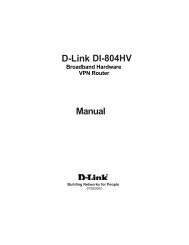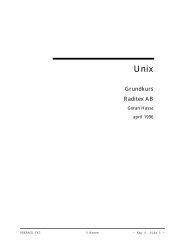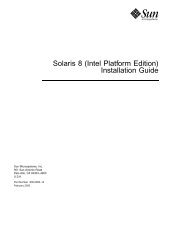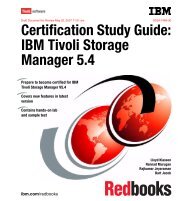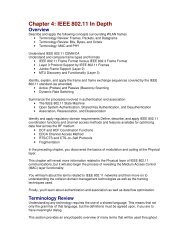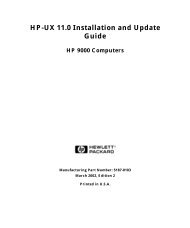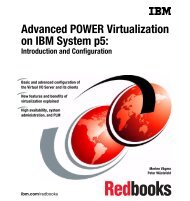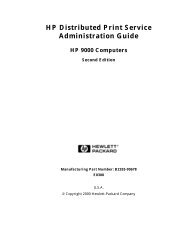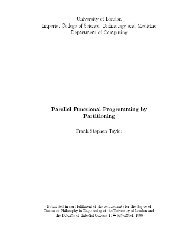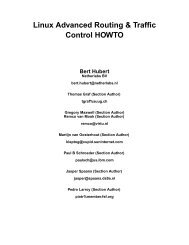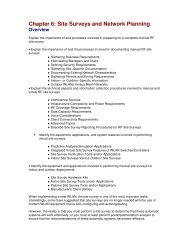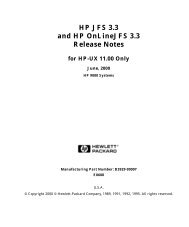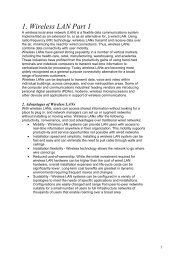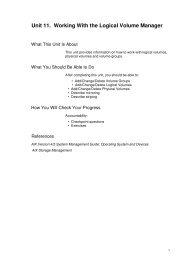- Page 1 and 2: man Pages(5): Headers, Tables and M
- Page 3 and 4: Contents PREFACE vii Intro(5) 2 aio
- Page 5 and 6: me(5) 232 mm(5) 237 mqueue(5) 244 m
- Page 7 and 8: PREFACE Overview A man page is prov
- Page 9 and 10: | Separator. Only one of the argume
- Page 11 and 12: values other than zero for various
- Page 13 and 14: Headers, Tables, and Macros Intro(5
- Page 15 and 16: Headers, Tables, and Macros Intro(5
- Page 17 and 18: Headers, Tables, and Macros Intro(5
- Page 19 and 20: Headers, Tables, and Macros aio(5)
- Page 21 and 22: Headers, Tables, and Macros ascii(5
- Page 23: Headers, Tables, and Macros attribu
- Page 27 and 28: Headers, Tables, and Macros attribu
- Page 29 and 30: Headers, Tables, and Macros attribu
- Page 31 and 32: Headers, Tables, and Macros attribu
- Page 33 and 34: Headers, Tables, and Macros charmap
- Page 35 and 36: Headers, Tables, and Macros charmap
- Page 37 and 38: Headers, Tables, and Macros environ
- Page 39 and 40: Headers, Tables, and Macros environ
- Page 41 and 42: Headers, Tables, and Macros environ
- Page 43 and 44: Headers, Tables, and Macros environ
- Page 45 and 46: Headers, Tables, and Macros extensi
- Page 47 and 48: Headers, Tables, and Macros fcntl(5
- Page 49 and 50: Headers, Tables, and Macros fcntl(5
- Page 51 and 52: Headers, Tables, and Macros filesys
- Page 53 and 54: Headers, Tables, and Macros filesys
- Page 55 and 56: Headers, Tables, and Macros filesys
- Page 57 and 58: Headers, Tables, and Macros filesys
- Page 59 and 60: Headers, Tables, and Macros filesys
- Page 61 and 62: Headers, Tables, and Macros floatin
- Page 63 and 64: Headers, Tables, and Macros fnmatch
- Page 65 and 66: Headers, Tables, and Macros fnmatch
- Page 67 and 68: Headers, Tables, and Macros fnmatch
- Page 69 and 70: Headers, Tables, and Macros fns(5)
- Page 71 and 72: Headers, Tables, and Macros fns_dns
- Page 73 and 74: Headers, Tables, and Macros fns_fil
- Page 75 and 76:
Headers, Tables, and Macros fns_ini
- Page 77 and 78:
Headers, Tables, and Macros fns_nis
- Page 79 and 80:
Headers, Tables, and Macros fns_nis
- Page 81 and 82:
Headers, Tables, and Macros fns_pol
- Page 83 and 84:
Headers, Tables, and Macros fns_pol
- Page 85 and 86:
Headers, Tables, and Macros fns_ref
- Page 87 and 88:
Headers, Tables, and Macros fns_ref
- Page 89 and 90:
Headers, Tables, and Macros fns_x50
- Page 91 and 92:
Headers, Tables, and Macros formats
- Page 93 and 94:
Headers, Tables, and Macros formats
- Page 95 and 96:
Headers, Tables, and Macros formats
- Page 97 and 98:
Headers, Tables, and Macros iconv_1
- Page 99 and 100:
Headers, Tables, and Macros iconv_1
- Page 101 and 102:
Headers, Tables, and Macros iconv_1
- Page 103 and 104:
Headers, Tables, and Macros iconv_1
- Page 105 and 106:
Headers, Tables, and Macros iconv_1
- Page 107 and 108:
Headers, Tables, and Macros iconv_1
- Page 109 and 110:
Headers, Tables, and Macros iconv_1
- Page 111 and 112:
Headers, Tables, and Macros iconv(5
- Page 113 and 114:
Headers, Tables, and Macros iconv(5
- Page 115 and 116:
Headers, Tables, and Macros iconv(5
- Page 117 and 118:
Headers, Tables, and Macros iconv_6
- Page 119 and 120:
Headers, Tables, and Macros iconv_6
- Page 121 and 122:
Headers, Tables, and Macros iconv_8
- Page 123 and 124:
Headers, Tables, and Macros iconv_8
- Page 125 and 126:
Headers, Tables, and Macros iconv_8
- Page 127 and 128:
Headers, Tables, and Macros iconv_8
- Page 129 and 130:
Headers, Tables, and Macros iconv_8
- Page 131 and 132:
Headers, Tables, and Macros iconv_8
- Page 133 and 134:
Headers, Tables, and Macros iconv_8
- Page 135 and 136:
Headers, Tables, and Macros iconv_8
- Page 137 and 138:
Headers, Tables, and Macros iconv_8
- Page 139 and 140:
Headers, Tables, and Macros iconv_8
- Page 141 and 142:
Headers, Tables, and Macros iconv_8
- Page 143 and 144:
Headers, Tables, and Macros iconv_8
- Page 145 and 146:
Headers, Tables, and Macros iconv_8
- Page 147 and 148:
Headers, Tables, and Macros iconv_d
- Page 149 and 150:
Headers, Tables, and Macros iconv_d
- Page 151 and 152:
Headers, Tables, and Macros iconv_k
- Page 153 and 154:
Headers, Tables, and Macros iconv_k
- Page 155 and 156:
Headers, Tables, and Macros iconv_k
- Page 157 and 158:
Headers, Tables, and Macros iconv_k
- Page 159 and 160:
Headers, Tables, and Macros iconv_m
- Page 161 and 162:
Headers, Tables, and Macros iconv_m
- Page 163 and 164:
Headers, Tables, and Macros iconv_m
- Page 165 and 166:
Headers, Tables, and Macros iconv_m
- Page 167 and 168:
Headers, Tables, and Macros iconv_p
- Page 169 and 170:
Headers, Tables, and Macros iconv_p
- Page 171 and 172:
Headers, Tables, and Macros iconv_u
- Page 173 and 174:
Headers, Tables, and Macros iconv_u
- Page 175 and 176:
Headers, Tables, and Macros iconv_u
- Page 177 and 178:
Headers, Tables, and Macros in(5) N
- Page 179 and 180:
Headers, Tables, and Macros inet(5)
- Page 181 and 182:
Headers, Tables, and Macros isalist
- Page 183 and 184:
Headers, Tables, and Macros langinf
- Page 185 and 186:
Headers, Tables, and Macros langinf
- Page 187 and 188:
Headers, Tables, and Macros largefi
- Page 189 and 190:
Headers, Tables, and Macros lf64(5)
- Page 191 and 192:
Headers, Tables, and Macros lf64(5)
- Page 193 and 194:
Headers, Tables, and Macros lf64(5)
- Page 195 and 196:
Headers, Tables, and Macros lfcompi
- Page 197 and 198:
Headers, Tables, and Macros lfcompi
- Page 199 and 200:
Headers, Tables, and Macros locale(
- Page 201 and 202:
Headers, Tables, and Macros locale(
- Page 203 and 204:
Headers, Tables, and Macros locale(
- Page 205 and 206:
Headers, Tables, and Macros locale(
- Page 207 and 208:
Headers, Tables, and Macros locale(
- Page 209 and 210:
Headers, Tables, and Macros locale(
- Page 211 and 212:
Headers, Tables, and Macros locale(
- Page 213 and 214:
Headers, Tables, and Macros locale(
- Page 215 and 216:
Headers, Tables, and Macros locale(
- Page 217 and 218:
Headers, Tables, and Macros locale(
- Page 219 and 220:
Headers, Tables, and Macros locale(
- Page 221 and 222:
Headers, Tables, and Macros locale(
- Page 223 and 224:
Headers, Tables, and Macros locale(
- Page 225 and 226:
Headers, Tables, and Macros locale(
- Page 227 and 228:
Headers, Tables, and Macros locale(
- Page 229 and 230:
Headers, Tables, and Macros locale(
- Page 231 and 232:
Headers, Tables, and Macros locale(
- Page 233 and 234:
Headers, Tables, and Macros man(5)
- Page 235 and 236:
Headers, Tables, and Macros man(5)
- Page 237 and 238:
Headers, Tables, and Macros mansun(
- Page 239 and 240:
Headers, Tables, and Macros mansun(
- Page 241 and 242:
Headers, Tables, and Macros math(5)
- Page 243 and 244:
Headers, Tables, and Macros me(5) N
- Page 245 and 246:
Headers, Tables, and Macros me(5) .
- Page 247 and 248:
Headers, Tables, and Macros me(5) /
- Page 249 and 250:
Headers, Tables, and Macros mm(5) M
- Page 251 and 252:
Headers, Tables, and Macros mm(5) M
- Page 253 and 254:
Headers, Tables, and Macros mm(5) N
- Page 255 and 256:
Headers, Tables, and Macros mqueue(
- Page 257 and 258:
Headers, Tables, and Macros ms(5) M
- Page 259 and 260:
Headers, Tables, and Macros ms(5) M
- Page 261 and 262:
Headers, Tables, and Macros ms(5) F
- Page 263 and 264:
Headers, Tables, and Macros netdb(5
- Page 265 and 266:
Headers, Tables, and Macros netdb(5
- Page 267 and 268:
Headers, Tables, and Macros netdb(5
- Page 269 and 270:
Headers, Tables, and Macros nfssec(
- Page 271 and 272:
Headers, Tables, and Macros pam_dia
- Page 273 and 274:
Headers, Tables, and Macros pam_sam
- Page 275 and 276:
Headers, Tables, and Macros pam_sam
- Page 277 and 278:
Headers, Tables, and Macros pam_uni
- Page 279 and 280:
Headers, Tables, and Macros prof(5)
- Page 281 and 282:
Headers, Tables, and Macros regex(5
- Page 283 and 284:
Headers, Tables, and Macros regex(5
- Page 285 and 286:
Headers, Tables, and Macros regex(5
- Page 287 and 288:
Headers, Tables, and Macros regex(5
- Page 289 and 290:
Headers, Tables, and Macros regex(5
- Page 291 and 292:
Headers, Tables, and Macros regexp(
- Page 293 and 294:
Headers, Tables, and Macros regexp(
- Page 295 and 296:
Headers, Tables, and Macros regexp(
- Page 297 and 298:
Headers, Tables, and Macros sched(5
- Page 299 and 300:
Headers, Tables, and Macros sgml(5)
- Page 301 and 302:
Headers, Tables, and Macros sgml(5)
- Page 303 and 304:
Headers, Tables, and Macros siginfo
- Page 305 and 306:
Headers, Tables, and Macros siginfo
- Page 307 and 308:
Headers, Tables, and Macros signal(
- Page 309 and 310:
Headers, Tables, and Macros signal(
- Page 311 and 312:
Headers, Tables, and Macros signal(
- Page 313 and 314:
Headers, Tables, and Macros signal(
- Page 315 and 316:
Headers, Tables, and Macros socket(
- Page 317 and 318:
Headers, Tables, and Macros socket(
- Page 319 and 320:
Headers, Tables, and Macros standar
- Page 321 and 322:
Headers, Tables, and Macros standar
- Page 323 and 324:
Headers, Tables, and Macros standar
- Page 325 and 326:
Headers, Tables, and Macros stat(5)
- Page 327 and 328:
Headers, Tables, and Macros stdarg(
- Page 329 and 330:
Headers, Tables, and Macros sticky(
- Page 331 and 332:
Headers, Tables, and Macros term(5)
- Page 333 and 334:
Headers, Tables, and Macros term(5)
- Page 335 and 336:
Headers, Tables, and Macros time(5)
- Page 337 and 338:
Headers, Tables, and Macros types(5
- Page 339 and 340:
Headers, Tables, and Macros ucontex
- Page 341 and 342:
Headers, Tables, and Macros unistd(
- Page 343 and 344:
Headers, Tables, and Macros unistd(
- Page 345 and 346:
Headers, Tables, and Macros unistd(
- Page 347 and 348:
Headers, Tables, and Macros unistd(
- Page 349 and 350:
Headers, Tables, and Macros values(
- Page 351 and 352:
Headers, Tables, and Macros varargs
- Page 353 and 354:
Headers, Tables, and Macros vgrinde
- Page 355 and 356:
Headers, Tables, and Macros vgrinde
- Page 357 and 358:
Headers, Tables, and Macros wstat(5
- Page 359 and 360:
Index A ANSI — standards and spec
- Page 361 and 362:
formats — file format notation, 8
- Page 363 and 364:
S — regexp, 279 — step, 279 sgm



